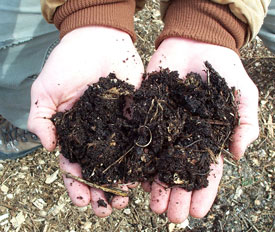Understanding compost
... More than just a trash heap!
January 2014
In my first column we discussed the difference between garden soil and potting mix. You may recall that potting mixes are all about giving plants an “even playing field”, that is a manufactured perfect blend of organic matter, minerals trace elements, nutrition and most importantly air.
Compost is ideally a mixture of decayed green matter, which has finished the heat-generating phase of the decomposition cycle and is close to the material we know as humus.
In nature humus accumulates naturally as leaf litter and other dead matter accumulating on a forest floor. With time and weight of material this matter breaks down in composition and is incorporated into the soil by the action of earthworms and natural elements.
So here is nature’s hint as to what to do with compost… Add it to the top of your garden to replenish the organic matter in your soil.
The nutrient content however is only as good as the material that was composted, and will still need some added fertiliser if you are to grow successive crops of say vegetables.
Mulch on the other hand is really any shredded matter that can be spread on top of a surface. It almost certainly will not be composted which means it will still be decaying, and taking nitrogen and other goodies out of the soil below. It is therefore a good idea to spread a balanced NPK fertiliser on a garden before spreading mulch.
There are two good reasons for spreading mulch on your garden?
- To retain moisture, and lower root zone temperatures.
- To suppress weed growth.
Compost and mulch are readily available from Go Gardening stores, but compost is relatively easy to make yourself. So get composting and spread mulch far and wide. Your garden will thank you for it.
27-Jan-2014


